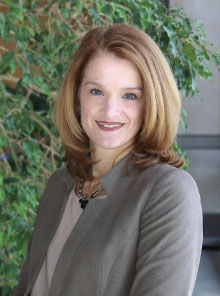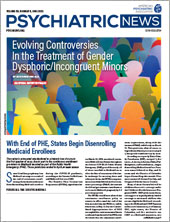Even in the most highly populated cities, successfully referring a patient to a mental health professional can mean the patient will linger on a months-long wait list. For pregnant or postpartum patients, such a delay in much-needed psychiatric treatment has a huge impact on both mothers and children.
A new phone consultation program in Texas is aiming to meet the mental health needs of perinatal women by easily connecting obstetricians with psychiatrists. “Clinicians are calling us because they’re worried about their patients and trying to find a mental health provider to connect them with, but in the meantime, they’re asking what they can do,” said Latoya Frolov, M.D., an assistant professor of psychiatry at UT Southwestern Medical Center and the assistant medical director of UT Southwestern’s Perinatal Psychiatric Access Network (PeriPAN).
Launched in August, PeriPAN is a state-funded pilot program that provides real-time support to clinicians on issues such as medication management and treatment plans for patients before, during, and after their pregnancies. It is an extension of a similar program in Texas called the Child Psychiatry Access Network, which connects pediatricians with child/adolescent psychiatrists and has grown from a regional into a statewide program. PeriPAN, which obstetric practices can call at no cost, is staffed by psychiatrists and other mental health care professionals.
“We’re making sure these clinicians know that, yes, they can get these patients started with treatment, and we shouldn’t delay care while we are waiting to refer patients to a mental health professional,” Frolov said.
Right now, PeriPAN is based at four health-related institutions in Texas (The University of Texas at Austin Dell Medical School, Texas Tech University Health Sciences Center at Lubbock, the University of Texas Southwestern Medical Center, and Baylor College of Medicine). In addition to offering treatment advice, PeriPAN also helps clinicians in those regions identify potential referrals for their patients. The goal is to eventually grow PeriPAN so it can serve the entire state, Frolov said.
“There are still a lot of people throughout the state, especially in rural areas, who need support,” Frolov said. “Part of the hope is that, by providing this care, we are preventing a lot of adverse outcomes for women and infants. I’m hopeful that we can improve relationships between women and their children, as well as the rest of their families.”
PeriPAN is based on a model developed at UMass Chan Medical School by Nancy Byatt, D.O., M.B.A., called the Massachusetts Child Psychiatry Access Program (MCPAP) for Moms, which is funded by the Massachusetts Department of Mental Health. There are now 21 programs across the country that are modeled on MCPAP for Moms, with five other states in the process of launching their own programs.
While completing her fellowship at Brigham and Women’s Hospital, Byatt said she was seeing gaps in mental health care for perinatal women due to the shortage of psychiatrists. Patients were waiting four months to see a psychiatrist and receive treatment Byatt said. “Obstetricians wanted to address patients’ mental health, but they didn’t know what to do, and they didn’t have the necessary skills, resources, or training,” she said.
Byatt, who was the founding medical director of
MCPAP for Moms, said she and her colleagues conducted focus groups with obstetricians, nurses, and other health professionals, as well as pregnant and postpartum women, to find out how to fill the gaps. The overwhelming consensus was that health professionals needed an easy way to contact psychiatrists so they could begin treating their patients’ mental health concerns while waiting to be seen by a mental health professional. MCPAP for Moms quickly grew into a statewide, state-funded program. Byatt and her colleagues started the Lifeline for Moms program at UMass Chan Medical School soon after because they were getting so many questions on how other states could implement their own MCPAP for Moms.
“With 21 programs, we have the potential to cover more than half of the births in the country,” Byatt said. She and her colleagues have also developed and are researching a program called PRISM (Program in Support of Moms). PRISM includes all the features of MCPAP for Moms, but also integrates mental health care into obstetric practices by incorporating additional interventions. “We work with the practice to help them implement depression screenings so that it is part of the workflow, just like gestational diabetes, which is screened, assessed, and followed up until remission,” Byatt said.
“Perinatal depression doesn’t just affect the individual who is experiencing it,” Frolov said. “It affects everyone in that family. It interferes with attachment between parents and their children as well. A lot of providers are afraid of treating depression, especially in pregnant or postpartum women, and we are trying to spread more education that it is not only possible, but also is good for everyone in the family.” ■


